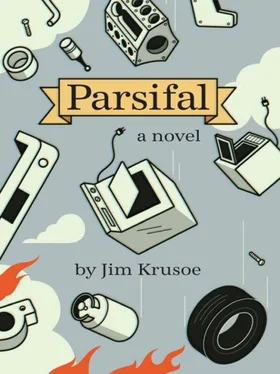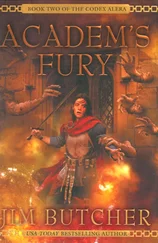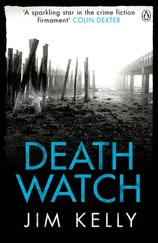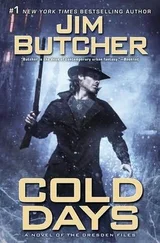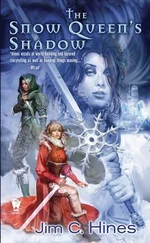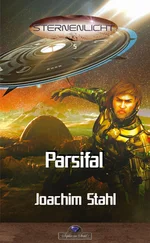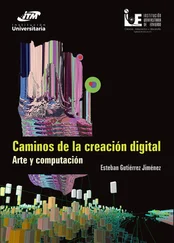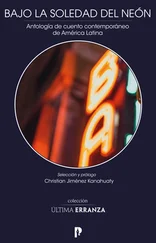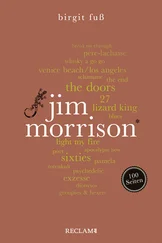On the bark of the tree to which their door was tied Conrad had carved three anchors.
“What are those anchors?” Parsifal asked his father one afternoon when the sun was setting and the canopy of leaves above them was a lovely golden green.
“They represent our family: you, your mother, and me,” Conrad answered, “and I carved them on this tree next to the door to our house because you and your mother are my twin anchors of life, along with me, who makes the third.”
“Which one am I?” Parsifal asked, and Conrad pointed to the smallest of the three.
An hour later Conrad left to return to the city, and Parsifal never got the chance to ask him how a person could anchor his own life.
Too bad , he thought.
“Excuse me,” Parsifal said to one of the blind men who had fallen behind the rest of the blind men who were walking ahead of him in a kind of knot, something that frequently happened, he had noticed, when people “bunched up” because they could not see.
“Excuse me,” he repeated.
So the man, who was better dressed than the others, stopped walking and tapping, and turned to face in the direction of the voice that was speaking to him.
“Do you happen to know if there is a forest somewhere in the vicinity?” Parsifal asked.
This man wore a sort of brownish tweed sport coat and a light blue ascot. He pointed his finger into the air as a signal that he wished a moment or two to consider Parsifal’s question. Then he moved his head from side to side, squinted, and rubbed his narrow cane against the shin of his left leg. Parsifal noticed that his trousers were unusually well creased, and that his cane, like the canes of all the blind, was white. At last, the man aimed the tip of his cane toward the ground.
“Certainly,” the blind man said, “it’s not that far from where we are at this very moment. All you need to do is to follow that road”—here he uncannily pointed to one of the several roads leading to and from Parsifal’s neighborhood—“until you come to a factory that makes pencils, turn left, and continue for about a mile. I don’t see how you can miss it; it’s quite well kept, in its way.”
Parsifal wanted to ask the man how he and his fellows had chosen his neighborhood to practice their walking. How did they arrive? Were they bussed in or did they walk to get there? Did they sleep together in a dormitory somewhere or inside people’s houses? Did they dream, and if so, of what? Instead, he thanked the man, who nodded and continued his moving and tapping away from Parsifal.
Parsifal reentered his house and, using his favorite fountain pen, a classic Parker 51, wrote down the man’s instructions so as not to forget them.
“The sand,” he had told Joe.
Even though, according to the blind man’s directions, the forest was nearby, there was no telling how long it would take him to find his former home — if indeed he could recognize it at all. So Parsifal took out a canteen and filled it with water. He found the travel fountain pen he liked to bring along on trips, a few sheets of decent paper just in case he should be forced to leave a note somewhere, and made five sandwiches — one ham and cheese, two vegetarian-avocado, one turkey-Swiss, and one peanut butter and banana. Also, he packed a hat, a plastic bottle of sunscreen, a fold-up poncho in case of rain, a toothbrush, and a small tube of toothpaste. If nothing else, his years in the forest had taught him the hard way the importance of proper dental hygiene. To all of this he added a box of matches in case he needed to start a fire, an extra pair of socks, and, last but not least, a round compass with a folding top just in case the blind man’s directions should prove inaccurate.
By the time Parsifal had assembled everything, it was too late to set off, and so, after eating one of the vegetarian-avocado sandwiches as an early supper, he transferred the remaining ones to the refrigerator and brushed his teeth. Then he lay in bed wondering if those packages of pork or beef or lamb he sometimes passed in meat departments had friends during their brief life spans. Were there familiar faces they were glad to see, or others, now possibly meat themselves, whose days would oft be brightened by their appearance? He remembered that the squirrel that was later eaten by the bear used to follow him around those hours Parsifal released it from its cage, and sometimes birds had dropped down and called to him. Who had Parsifal been to them that they should be so glad to see him? Did those packages of meat in the meat department also feel love, or something close to it? Did they believe their lives had meaning? Did they enjoy spending time “just hanging out” with their friends? Did they like being alone, and if so, what did they think about during those times?
And when they slept their final sleep on beds of Styrofoam, did they dream?
His infinite wisdom .
The following day was sunny and bright, the air crisp and invigorating — a good sign. Parsifal walked and the scenery flew by. He passed an old guy watering his lawn, and an old woman sweeping her sidewalk, and a three-legged dog. The old woman jumped a little when she saw his face, but the old guy and the dog did not. Most miraculous of all, nothing was falling from the sky, at least not near him. True, every so often, far off in the distance, he heard the sound of a falling car radiator, as mournful as a harmonica played around a campfire by a lonesome cowboy, but other than that, the only sounds were birds, insects, and the wind.
Most people, when they first saw his face, became extra friendly, and that’s all.
The blind man had been right: in nearly no time Parsifal reached the pencil factory and it was an impressive sight. Surrounded by a yellow wooden fence, the factory yard was as big as a football field, with the factory building itself off to one side, squatting between the two thirty-yard lines. At one end of the yard were piles of trees stacked in squares two stories high, and at the other end were gray cones of powdered graphite, looking like the gigantic teepees of some depressed Indian tribe. Between them, sprawling in the sun, was a miniature city made of pallets loaded with boxes of yellow pencils sealed in clear plastic. Outside the gates, heaps of sawdust waited to be hauled away. Parsifal saw that the factory, like many buildings those days, had reinforced its roof to prevent damage from falling objects.
A turkey-Swiss would taste great , he thought, and found a bus bench across from the pencil plant and sat down.
That was when Parsifal noticed the bird above his head.
“To live is to suffer,” a librarian once told Parsifal after they had finished being intimate on her foldout couch. They were watching a documentary about a drought in Africa on the local public television station. Then she added, as an afterthought, “Present company excepted.”
Of course, it was also possible that the bird was not a bird at all, but a remote-controlled aircraft, programmed by some anonymous controller back at “the base” to follow Parsifal day in and day out. But how then would it refuel? There would have to be at least two craft, and one would replace the other when the first had run out of gas, or whatever kind of fuel it used. True, he had never seen the two of them together, but he hadn’t been watching the sky at all times, and they could have traded places under cover of the dark.
Also, there was the question (if it was an aircraft and not a bird) of how it knew it was him . The first possibility was that a camera, possibly infrared, might be on board, and the images transmitted of him going about his daily business would appear on a screen in a room somewhere, in front of a technician trained to monitor such reception. (Parsifal imagined a screen with crosshairs to keep him centered.) It would be the technician’s job to move the aircraft as Parsifal moved. Perhaps a skilled technician could even keep track of two or three such aircraft — that is, assuming there were more people than him being tracked.
Читать дальше
